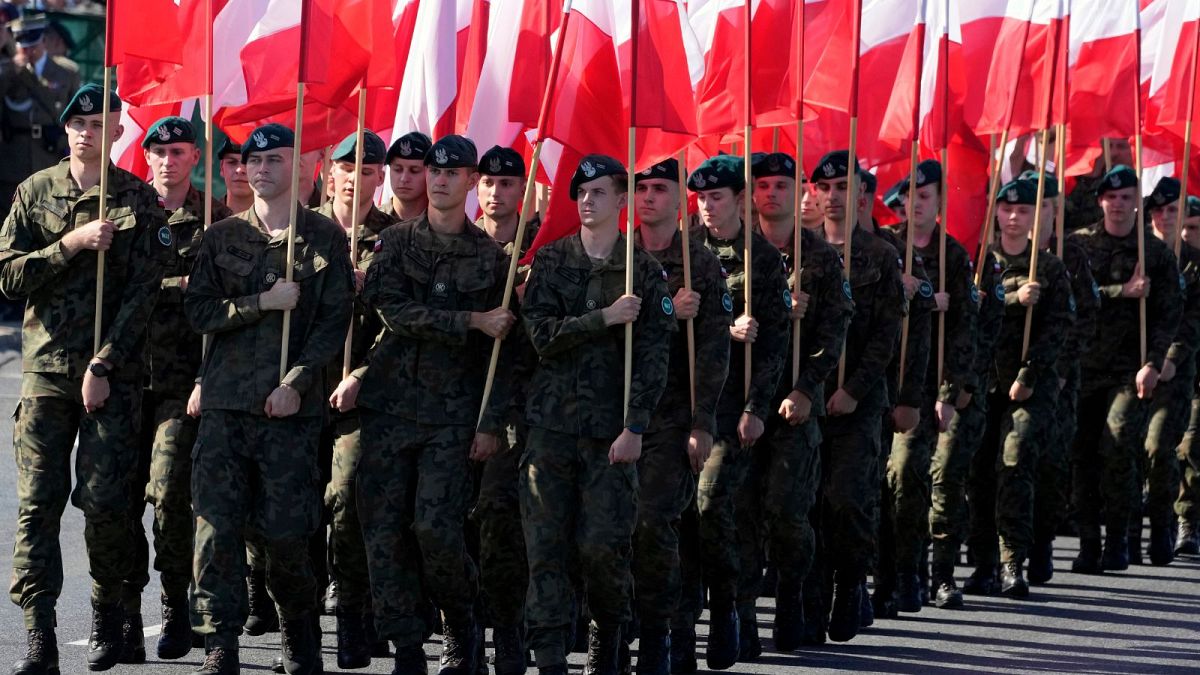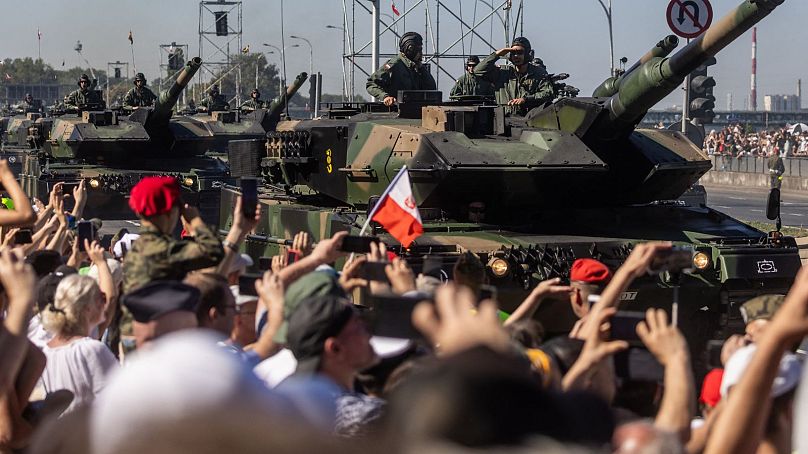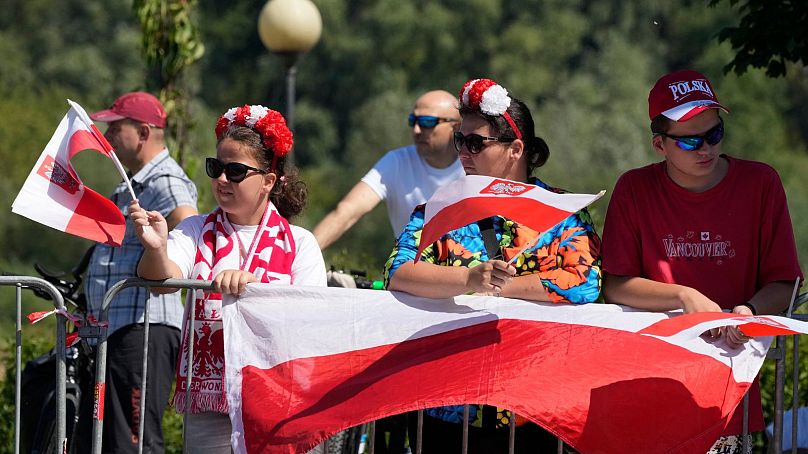Through a series of major arms deals, Poland is set to establish military supremacy in continental Europe - though the high cost of this expansion is a source of concern for some experts.
If everything goes according to plan, Europe will soon have a new military superpower: Poland.
The leaders of the country’s ruling party Law & Justice (PiS) have recently announced that the country is set to have the strongest army in Europe within the next two years, thanks to the major modernisation of its existing equipment and a massive reinforcement of its troops.
The military has been one of the most important topics of discussion in Poland since the beginning of Russia’s invasion of Ukraine last year, as the country prepares for the risk of the conflict at its border spilling into its territory.
“The Polish army must be so powerful that it does not have to fight due to its strength alone,” said Polish Prime Minister Mateusz Morawiecki in November last year, as the country celebrated independence from the Soviet Union.
He promised that the country would have “the most powerful land forces in Europe.”
“We want peace, and if we want that we must prepare for war - in connection with that, we are strengthening the Polish Army in contrast to those who governed until 2015,” said Defence Minister Mariusz Błaszczak.
But is this major rearmament programme an objectively realistic goal - or simply a costly promise meant to boost support for PiS ahead of the country’s election later this year?
Poland’s plan for Europe’s strongest army explained
According to the Global Firepower’s 2023 Military Strength Ranking, the strongest militaries in Europe - after Russia - are currently the UK, France, and Italy. The UK’s position is mostly due to its manpower and airpower, while France can count on a strong helicopter fleet and several destroyer warships. Italy had 404 helicopters and two aircraft carriers as of January 2023. Poland was fifth in the ranking.
Poland has already set in motion the plan that will lead it to obtain Europe’s strongest army.
“Poland is in a state of transition, it made orders for hundreds of American, German, and South Korean vehicles, and it has expanded its defence spending to more than 3% of its GDP,” Frank Ledwidge, a barrister and former military officer who has served in the Balkans, Iraq, and Afghanistan, told Euronews.
Last year, the president of Poland - a country that has been a full member of NATO since 1999 - signed into law a bill that allowed the government to spend 3% of its GDP on defence from 2023 on - a full percentage point above what is expected of the alliance’s members.
By comparison, Germany has recently pledged to increase its defence spending to reach at least the 2% threshold set by NATO for its members. In 2021, according to the latest data made available by Eurostat, the EU countries that spent most of their GDP on defence were Greece (2.8%), Latvia (2.3%), Estonia (2.0%), Romania (1.9%), France, Cyprus, and Lithuania (1.8%).
Newly NATO member Finland, which has one of the strongest armies in Europe, plans to spend €6 billion, or 2.3% of its GDP in defence, in 2024 - which is actually €116 million less than it expected to spend this year.
If Deputy Prime Minister Jarosław Kaczyński gets his way, military spending in Poland could be increased to 5% of the country’s GDP in the next decade, as he has suggested.
Poland has also announced a major purchase of modern equipment and a massive recruitment operation that will likely take place in the coming years.
The country wants to recruit about 150,000 troops in the next decade, which will bring its army from the current 128,000 active personnel and 36,000 territorial defence troops to 300,000 soldiers by 2035. With the new troops, the country will create six armoured divisions - whereas France and Germany only have two, and the UK has one alone.
It has also purchased over a thousand new tanks and 600 artillery pieces, mainly from South Korea and the US. These will bring the country’s firepower to be more than that of the UK, France, Germany, and Italy combined.
In July, Poland received 33 new M1 Abrams tanks as part of a €4.5 billion ($4.9 billion) order of 250. The country is also waiting for most of the nearly 1,000 K2 Black Panther main battle tanks it has bought from South Korea, of which it has received the first 10. Some 180 K2 will be delivered to Poland by 2025 for €3.16 billion, while up to 820 of the tanks will be produced in Poland under the licence obtained by South Korea for the next 10 years.
In terms of artillery, Poland has spent €9.2 billion ($10 billion) to purchase 468 HIMARS rocket launchers of the same kind that helped Ukraine’s forces with its successes against the Russians last year.
Can Poland really achieve its ambitious goal?
With these orders in line, “there’s no doubt” that Poland can become Europe’s strongest army, said Ledwidge.
“Is it an electoral promise? Maybe, but they’re going to be left with an awful lot of egg on their face if they don’t go through with these orders, and I suspect massive contractual issues as well,” he said.
However, some concerns remain among experts and observers, especially over the costs of this military expansion.
The expansion of the training of new troops and the recruitment pipeline will be a “challenge”, Ledwidge said, that will have a logistical and financial burden on the country. “But we should remember that Poland is getting richer, unlike countries like the UK, so they can probably afford the expenses.”
The issue of the gargantuan cost of this expansion of the Polish army has been raised by Polish military expert Robert Czulda, a Resident Fellow at the Casimir Pulaski Foundation, who in a recent article said that the country will have to face a “gun or butter” dilemma as it tries to secure long-term financing.
“It seems highly likely that such a large scale of planned orders is largely driven by a political populism, aimed at gaining popularity here and now, rather than to be a real, comprehensive, and well-thought-out plan for harmoniously strengthening the armed forces,” he wrote.
“Poland should ensure that these procurement programmes are sustainable and affordable in the long term. The country should avoid a risk of overspending, which now seems very high.”
Sławomir Sierakowski, founder of the Krytyka Polityczna movement and a senior fellow at the German Council on Foreign Relations, warned that the impressive arm deals made by the Polish government “were made without government tenders, from a weak bargaining position, and without offset obligations from contractors.”
How is this going to change the political equilibrium in Europe?
As the strongest army in Europe, Poland “will be more than capable of defending themselves and the Baltic states with what they’re going to get, assuming that the investment comes through,” Ledwidge said.
“The incentives to go through with this are both political and strategic. Poland needs to have a very strong army because it has become the bulwark of NATO,” he added.
This would likely put the country in a new position within Europe and NATO.
“It’s very probable that Poland then will become either the primary or secondary continental European power after France,” said Ledwidge.
“And that will mean that the UK will lose in due course its role as second commander of NATO, which would be a big blow for the country, but it’s deserved.”
The new position of Poland within NATO and Europe will push countries like the UK or France “to ask whether it’s worth even having their ground forces as a priority,” Ledwidge said, “or whether they should instead reverse to their natural speciality, which for the UK is being a naval power - something that’s being lost as we try to do all at once.”


